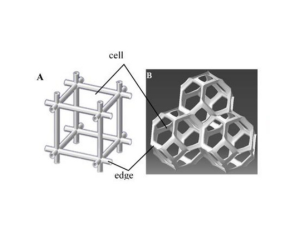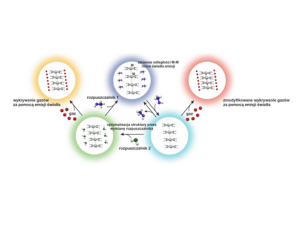Pursuant to § 7 sections 1 and 3 of Resolution No. 91/IX/2021 of the Senate of the Jagiellonian University of 29 September 2021 on: the rules of recruitment for the Doctoral School of Exact and Natural Sciences at the Jagiellonian University in the academic year 2022/2023, the Director of the Doctoral School of Exact and Natural Sciences announces a competition for one doctoral student with a scholarship financed from the research project funds as part of the Chemistry PhD study programme.
Within the Sonata Bis 11 project entitled “Photoswitchable and chimeric molecules for spatially restricted and endoplasmic reticulum-specific blockade of PD-L1 protein”, a commission set up at the School will conduct recruitment for the Chemistry PhD study programme.
The project manager, Lukasz Skalniak, PhD offers an opportunity to complete the doctorate in the following area: In vitro and in vivo characterization and modeling of immune checkpoint expression for testing novel immunotherapeutic strategies
After the interviews and the evaluation of the candidates, the Chairman of the committee presents a report to the Director containing a list of candidates recommended for admission to the school as part of the research project.
Project description:
In recent years, immunotherapy has led to a revolution in the treatment of many types of cancer that were considered difficult to treat or even incurable, thus earning it the title of the fifth pillar of cancer therapy. Blockade of the PD-1/PD-L1 immune checkpoint is one of the most common strategies in modern immunotherapy. In the project presented here, new small-molecule compounds resulting from the chemical work will be tested on isolated human cancer cells cultured in 2D and 3D setups, to verify their anticancer potential. The most effective molecules will also be tested on mouse preclinical models to ultimately verify their therapeutic potential in the living organism. In addition to targeting the PD-1/PD-L1 immune checkpoint, the expression of other known immune receptors will be evaluated in primary tumor samples from patients treated for colorectal cancer. The project will also include the derivation of new in vitro models using genetic engineering methods. The project will be carried out in collaboration with an interdisciplinary team and other research institutions.
Candidate’s profile:
- knowledge of the basics of laboratory work, with particular focus on working with cell cultures and knowledge of the methods of molecular biology / cell biology / biochemistry,
- willingness to take on challenges and pursue independent, creative work,
- interest in conducting scientific work and commitment to the project,
- readiness to undertake and support teamwork,
- at least good knowledge of English,
- willingness to develop own scientific career,
- readiness to learn new laboratory techniques and computer-based data analysis, as well as to participate in scientific collaborations aimed at improvement of qualifications will be appreciated.
Schedule of the competition:
- Opening of the competition: 19.10.2022
- Application submission deadline: 02.11.2022
- Entrance exams: 03.11.2022-08.11.2022
- Announcement of results: 10.11.2022
- Enrolment: 14.11.2022 - 21.11.2022
- Enrollment (reserve list): 22.11.2022 - 21.12.2022
Detailed terms and procedures of admission - tailored to the specific PhD study programme according to the current Recruitment rules for the specific academic year: In academic year 2022/2023 in accordance with Resolution No 91/IX/2021 of the Senate of the Jagiellonian University of 29 September 2021 concerning: the rules of enrolment to the Doctoral School of Exact and Natural Sciences at the Jagiellonian University in the academic year 2022/2023
Admission rules for PhD study programme Chemistry.
Admission rules for PhD study programme Chemistry.
Application documents:
- curriculum vitae (CV)
- transcript of records (B.Sc. and M.Sc. studies)
- motivation letter
How to apply?
Please send your application documents to the project manager, Lukasz Skalniak, PhD at: lukasz.skalniak@uj.edu.pl and skalniak@chemia.uj.edu.pl
Documents required for entry within Chemistry PhD study programme:
- the original OAS application printed out from the system, containing a photograph;
- a photocopy and the original for inspection of: a diploma or other document of graduation of a higher education institution abroad entitling the holder to undertake education in order to obtain the degree of doctor in which it was issued, recognized as equivalent to the relevant Polish master's diploma, and if, by the date of entry, the candidate does not yet hold a master's diploma document, a certificate issued by the higher education institution confirming that the candidate has passed the diploma examination, containing information on the right to take up education in order to obtain the degree of doctor in whose system the institution operates, with the grades given from the diploma examination, from the diploma thesis and on the diploma (for graduates of the second degree studies also a certificate containing these grades from the completed first degree studies);
- a photocopy and the original for inspection: a diploma supplement;
- for inspection: identity document (passport in case of foreigners);
- originals of all other documents provided at the registration stage in the form of a scan.
In the event of exposure to harmful, noxious or hazardous factors, the applicant will, at the time of registration, be referred for a medical examination by an occupational medicine physician. The candidate shall be obliged to deliver, within the time limit set by the programme manager, a medical certificate confirming the absence of contraindications to take up education (applies only to some PhD study programmes).
Higher education diplomas awarded abroad should:
- bear an apostille clause if the issuing country is covered by the Convention abolishing the requirement legalisation for foreign public documents, done at The Hague on 5 October 1961 (Journal of Laws of 2005, No. 112, item 938) or
- be subjected to legalisation, in other cases.
Any document submitted in a language other than Polish or English must be accompanied by a certified translation into Polish or English.
Insurance:
Each doctoral student, including a foreigner, admitted to the doctoral school is obligatorily subject to health insurance if he/she is not covered by such insurance on other grounds (e.g. employment relationship, contract of mandate, business activity, insured as a family member under 26 years of age, as the spouse of an insured person). The health insurance contribution is paid by the Jagiellonian University and is financed from the State budget. In addition, a doctoral student receiving a doctoral scholarship is subject to compulsory retirement and disability insurance and accident insurance.
IMPORTANT:
A person admitted to the doctoral school begin education and acquire doctoral student rights upon taking the oath. The Department of Personal Affairs reports each doctoral student admitted to the School to compulsory health and social insurance at the commencement of education. Until that time foreign candidates are obliged to cover the costs of insurance for the time of travel, treatment, etc. individually.



